-
 Bitcoin
Bitcoin $102,949.6253
3.38% -
 Ethereum
Ethereum $2,338.4946
19.99% -
 Tether USDt
Tether USDt $0.9999
-0.02% -
 XRP
XRP $2.3968
8.64% -
 BNB
BNB $637.0250
3.78% -
 USDC
USDC $1.0000
-0.01% -
 Dogecoin
Dogecoin $0.2072
13.02% -
 Cardano
Cardano $0.7924
10.43% -
 TRON
TRON $0.2636
5.05% -
 Sui
Sui $3.9829
6.14% -
 Chainlink
Chainlink $16.2479
9.39% -
 Avalanche
Avalanche $23.5942
12.80% -
 Stellar
Stellar $0.3007
9.90% -
 Shiba Inu
Shiba Inu $0.0...01519
13.38% -
 Hedera
Hedera $0.2018
8.61% -
 Hyperliquid
Hyperliquid $25.2936
17.11% -
 Bitcoin Cash
Bitcoin Cash $414.7416
0.06% -
 Toncoin
Toncoin $3.2860
5.54% -
 UNUS SED LEO
UNUS SED LEO $8.7364
-0.74% -
 Litecoin
Litecoin $98.2278
6.74% -
 Polkadot
Polkadot $4.6909
10.44% -
 Monero
Monero $303.6835
1.99% -
 Dai
Dai $1.0000
-0.03% -
 Pepe
Pepe $0.0...01270
39.94% -
 Bitget Token
Bitget Token $4.4987
3.48% -
 Pi
Pi $0.7410
19.57% -
 Ethena USDe
Ethena USDe $1.0002
-0.01% -
 Uniswap
Uniswap $6.3515
21.66% -
 Bittensor
Bittensor $430.2143
7.45% -
 Aptos
Aptos $5.6979
11.74%
What can Loopring(LRC) coin be used for?
LRC coin empowers users to trade cryptocurrencies, stake for rewards, participate in governance, and contribute to the Loopring ecosystem's growth.
Dec 09, 2024 at 12:58 am
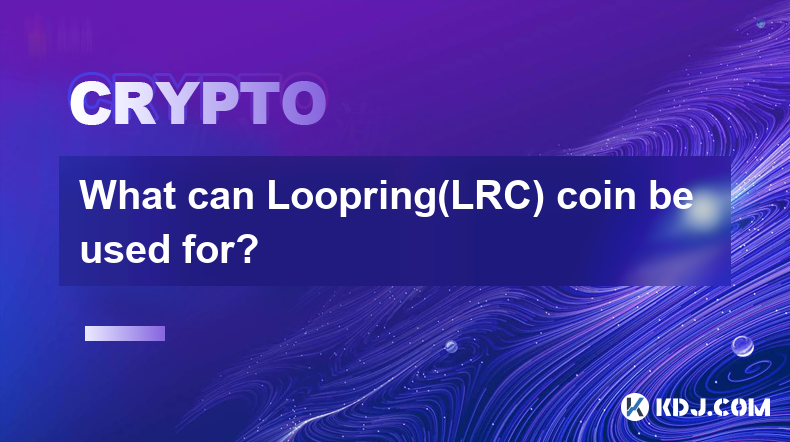
What Can Loopring (LRC) Coin Be Used For?
Introduction
Loopring (LRC) is an innovative blockchain protocol designed to revolutionize the decentralized exchange (DEX) landscape. It provides a secure, scalable, and cost-effective trading experience by enabling the construction of high-performance DEXs. Through its unique features and capabilities, LRC coin offers a wide range of use cases within the blockchain ecosystem.
Use Cases of Loopring (LRC) Coin
1. Decentralized Exchange Trading
LRC coin is primarily utilized for facilitating seamless and secure trading activities on Loopring-based DEXs. It serves as the native currency for trading pairs, allowing users to buy, sell, and exchange various cryptocurrencies without relying on third-party intermediaries. The decentralized infrastructure eliminates the risk of censorship, manipulation, and single points of failure, fostering a transparent and equitable trading environment.
2. Staking for Rewards
Loopring offers a lucrative staking mechanism that enables LRC holders to earn rewards for contributing to the network's security and stability. By locking their tokens for a specified duration, stakers participate in the consensus mechanism, validate transactions, and receive a portion of the network fees generated. This incentivizes users to support the protocol's growth and development while generating passive income.
3. Governance Participation
LRC coin empowers holders to actively participate in the governance of the Loopring protocol. Through a decentralized autonomous organization (DAO), LRC holders can submit proposals, vote on critical decisions, and influence the future direction of the project. This ensures that the platform remains driven by community consensus and aligned with the interests of its users.
4. Payment Gateway
Loopring's flexibility extends to its use as a payment gateway, enabling businesses to accept cryptocurrency payments for goods and services. By integrating with Loopring, merchants can offer their customers a convenient and cost-effective way to transact using LRC or other supported cryptocurrencies. This opens up new revenue streams and enhances the usability of blockchain technology in everyday commerce.
5. Developer Incentives
To foster innovation and attract talented developers to the Loopring ecosystem, LRC coin can be utilized to incentivize the creation and deployment of new applications and services on top of the platform. Developers can earn rewards through various bounty programs and grants, encouraging the development of innovative solutions that further expand the protocol's capabilities and utility.
6. Decentralized Insurance
Loopring's infrastructure can be leveraged to create decentralized insurance products, providing users with a robust and transparent alternative to traditional insurance models. By utilizing LRC coin, users can seamlessly purchase insurance policies, manage their coverage, and participate in risk pools, ensuring financial protection against potential losses or vulnerabilities within the blockchain ecosystem.
7. Liquidity Provision
LRC coin plays a pivotal role in providing liquidity to decentralized exchanges built on the Loopring protocol. Liquidity providers can deposit their assets into designated pools, enabling traders to access a deep and liquid order book. In return for contributing to market depth, liquidity providers earn trading fees proportional to their share of the pool, incentivizing participation and ensuring the smooth execution of transactions.
8. Non-Fungible Token (NFT) Trading
Loopring is actively exploring the integration of non-fungible token (NFT) support into its DEX framework. This would allow users to trade, sell, and acquire NFTs directly on Loopring-based platforms, leveraging the protocol's security, scalability, and low transaction costs. By facilitating the exchange of unique digital assets, Loopring expands its utility into the burgeoning NFT market.
Disclaimer:info@kdj.com
The information provided is not trading advice. kdj.com does not assume any responsibility for any investments made based on the information provided in this article. Cryptocurrencies are highly volatile and it is highly recommended that you invest with caution after thorough research!
If you believe that the content used on this website infringes your copyright, please contact us immediately (info@kdj.com) and we will delete it promptly.
- Rumble to Launch Bitcoin and Stablecoin Wallet in Q3 2025
- 2025-05-09 20:10:12
- Bitcoin Solaris (BTC-S) Offers Hard-Capped Digital Scarcity and Modernized Bitcoin (BTC) Functionality
- 2025-05-09 20:10:12
- Still Worth Buying Kaspa? KAS Price Outperformed by Meme Coins
- 2025-05-09 20:05:23
- Ethena [ENA] Has Been Trading Within a Descending Channel Since March
- 2025-05-09 20:05:23
- Bitcoin (BTC) Reclaims $100,000 as Spot ETFs Log Continued Inflows
- 2025-05-09 20:05:22
- Bitcoin price extends its rally, pushing past the $100000 mark to reach nearly $104000
- 2025-05-09 20:05:22
Related knowledge
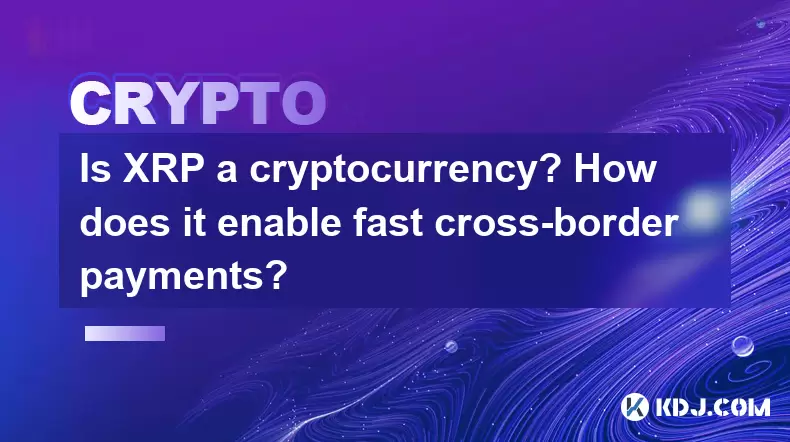
Is XRP a cryptocurrency? How does it enable fast cross-border payments?
May 09,2025 at 04:21pm
Is XRP a cryptocurrency? How does it enable fast cross-border payments? XRP is indeed a cryptocurrency, and it plays a significant role in facilitating fast cross-border payments. Created by Ripple Labs, XRP is designed to serve as a bridge currency in international transactions, enabling quick and cost-effective transfers between different currencies. ...
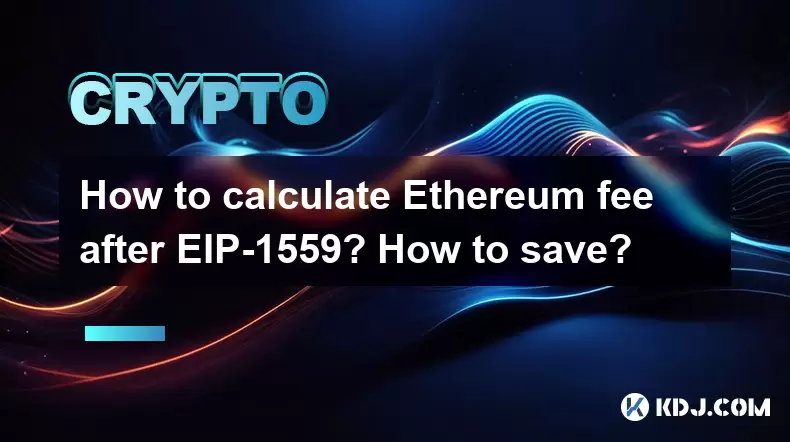
How to calculate Ethereum fee after EIP-1559? How to save?
May 09,2025 at 08:01am
The introduction of EIP-1559 in August 2021 brought significant changes to the Ethereum network's fee structure, revolutionizing how users interact with transaction costs. This article will delve into the specifics of how to calculate Ethereum fees post-EIP-1559 and offer strategies to save on these fees. Understanding EIP-1559 and its ComponentsEIP-155...
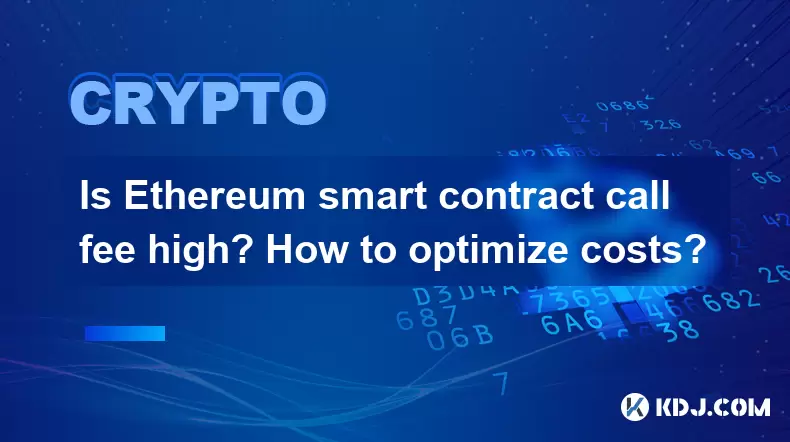
Is Ethereum smart contract call fee high? How to optimize costs?
May 08,2025 at 09:35am
Is Ethereum Smart Contract Call Fee High? How to Optimize Costs? The world of Ethereum smart contracts has revolutionized the way we think about decentralized applications and blockchain technology. However, one of the most frequently discussed topics within this realm is the cost associated with executing smart contract calls. In this article, we will ...
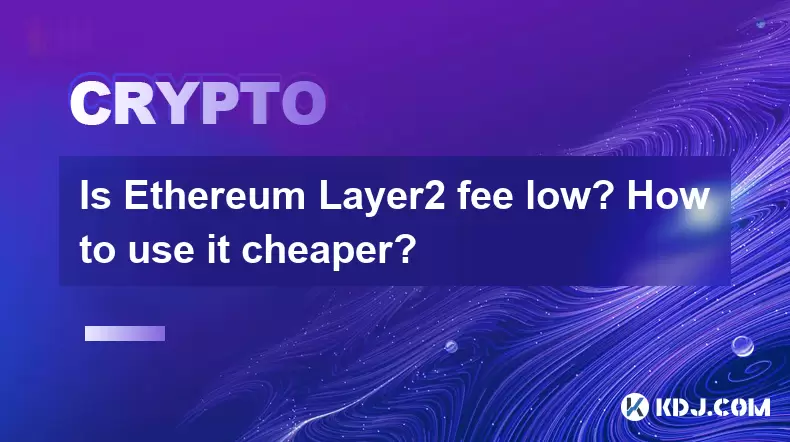
Is Ethereum Layer2 fee low? How to use it cheaper?
May 08,2025 at 03:56am
The question of whether Ethereum Layer 2 solutions offer lower fees and how to use them more economically is a topic of great interest within the cryptocurrency community. Ethereum's Layer 2 solutions have been developed to address the high transaction fees and scalability issues associated with the main Ethereum network. In this article, we will delve ...

How to calculate Ethereum network fee? How to reduce transaction costs?
May 08,2025 at 02:15am
Understanding and managing Ethereum network fees is crucial for anyone involved in transactions on the Ethereum blockchain. The network fee, also known as gas fee, is the amount of Ether (ETH) required to successfully conduct a transaction or execute a smart contract on the Ethereum network. Calculating these fees and finding ways to reduce them can sig...
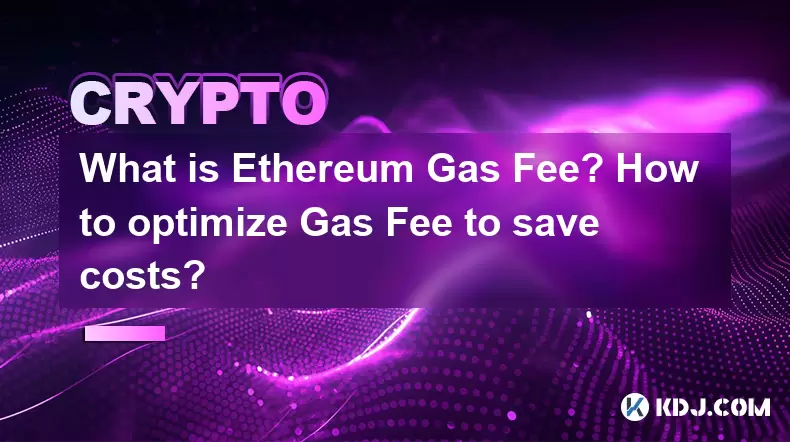
What is Ethereum Gas Fee? How to optimize Gas Fee to save costs?
May 08,2025 at 03:43am
Ethereum gas fees are a crucial aspect of interacting with the Ethereum blockchain. Understanding and optimizing these fees can significantly impact the cost-effectiveness of transactions and smart contract interactions. In this article, we will delve into what Ethereum gas fees are, how they are calculated, and provide detailed strategies for optimizin...

Is XRP a cryptocurrency? How does it enable fast cross-border payments?
May 09,2025 at 04:21pm
Is XRP a cryptocurrency? How does it enable fast cross-border payments? XRP is indeed a cryptocurrency, and it plays a significant role in facilitating fast cross-border payments. Created by Ripple Labs, XRP is designed to serve as a bridge currency in international transactions, enabling quick and cost-effective transfers between different currencies. ...

How to calculate Ethereum fee after EIP-1559? How to save?
May 09,2025 at 08:01am
The introduction of EIP-1559 in August 2021 brought significant changes to the Ethereum network's fee structure, revolutionizing how users interact with transaction costs. This article will delve into the specifics of how to calculate Ethereum fees post-EIP-1559 and offer strategies to save on these fees. Understanding EIP-1559 and its ComponentsEIP-155...

Is Ethereum smart contract call fee high? How to optimize costs?
May 08,2025 at 09:35am
Is Ethereum Smart Contract Call Fee High? How to Optimize Costs? The world of Ethereum smart contracts has revolutionized the way we think about decentralized applications and blockchain technology. However, one of the most frequently discussed topics within this realm is the cost associated with executing smart contract calls. In this article, we will ...

Is Ethereum Layer2 fee low? How to use it cheaper?
May 08,2025 at 03:56am
The question of whether Ethereum Layer 2 solutions offer lower fees and how to use them more economically is a topic of great interest within the cryptocurrency community. Ethereum's Layer 2 solutions have been developed to address the high transaction fees and scalability issues associated with the main Ethereum network. In this article, we will delve ...

How to calculate Ethereum network fee? How to reduce transaction costs?
May 08,2025 at 02:15am
Understanding and managing Ethereum network fees is crucial for anyone involved in transactions on the Ethereum blockchain. The network fee, also known as gas fee, is the amount of Ether (ETH) required to successfully conduct a transaction or execute a smart contract on the Ethereum network. Calculating these fees and finding ways to reduce them can sig...

What is Ethereum Gas Fee? How to optimize Gas Fee to save costs?
May 08,2025 at 03:43am
Ethereum gas fees are a crucial aspect of interacting with the Ethereum blockchain. Understanding and optimizing these fees can significantly impact the cost-effectiveness of transactions and smart contract interactions. In this article, we will delve into what Ethereum gas fees are, how they are calculated, and provide detailed strategies for optimizin...
See all articles





















































































